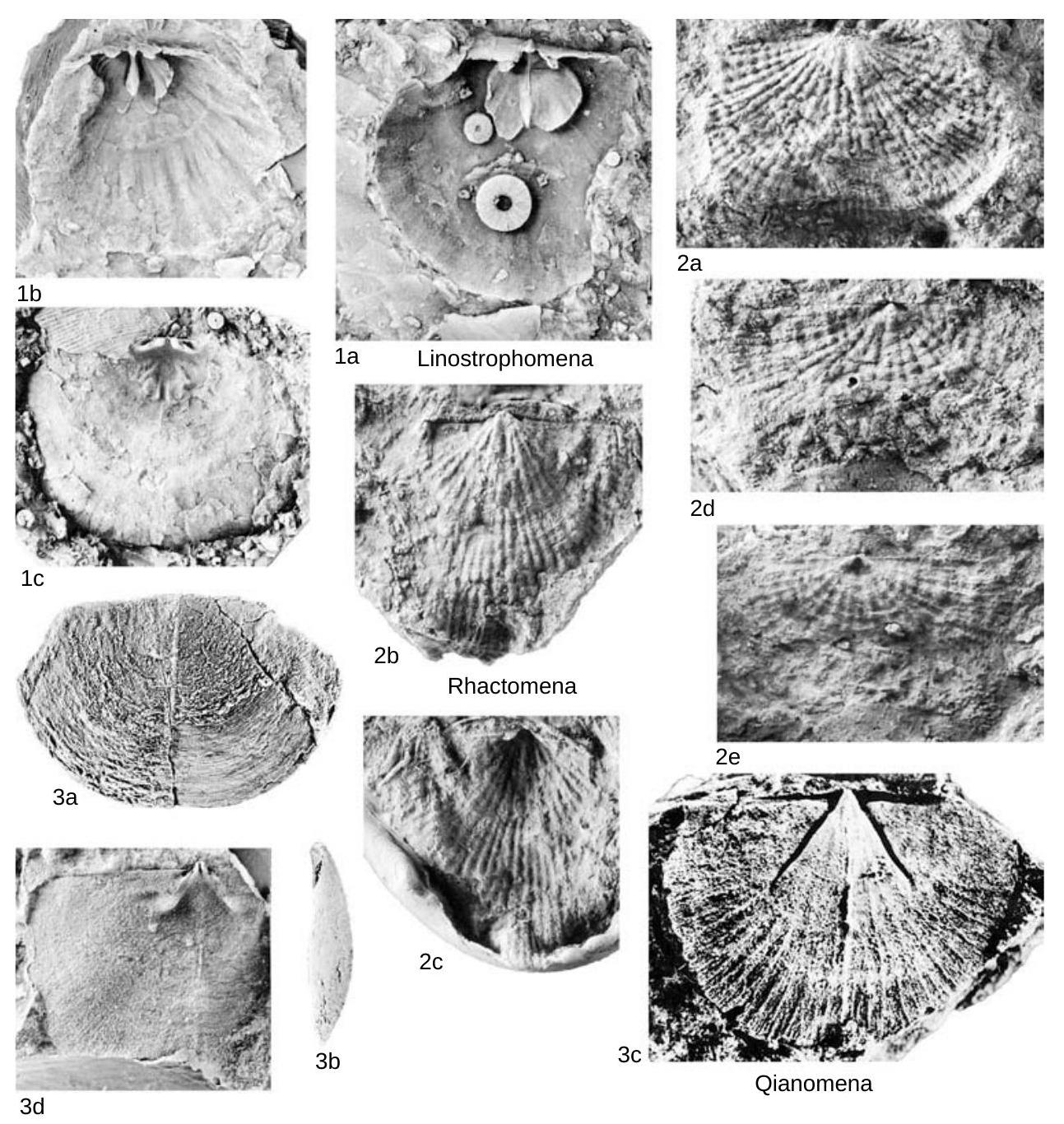Welcome to the Treatise on Invertebrate Paleontology!
Please enter a genera name to retrieve more information.

Qianomena
Classification
Phylum:
Brachiopoda
Subphylum:
Rhynchonelliformea
Class:
Strophomenata
Order:
Strophomenida
Superfamily:
Strophomenoidea
Family:
Glyptomenidae
Subfamily:
Glyptomeninae
Formal Genus Name and Reference:
Qianomena Rong & YANG, 1981, p. 173
Type Species:
Q. unicosta, OD
Images
(Click to enlarge in a new window)
Fig . 157,3a–d. *Q. unicosta, lower Xiangshuyuan Formation, upper Rhuddanian lower Aeronian; a,b, holotype, ventral, lateral views of conjoined valves, Yingwuxi, Sinan County, NIGP 43873, ×2; c, ventral internal mold, Hongyan reservoir, Sinan County, northeastern Guizhou Province, China, NIGP 43870, ×2; d, latex cast of dorsal internal mold, Hongyan Reservoir, Sinan County, northeastern Guizhou Province, China, NIGP 43868, ×3 (new).
Synonyms
Geographic Distribution
China
Age Range
Beginning Stage in Treatise Usage:
Silurian (Llandovery)
Beginning International Stage:
Rhuddanian
Fraction Up In Beginning Stage:
0
Beginning Date:
443.07
Ending Stage in Treatise Usage:
Silurian (Llandovery)
Ending International Stage:
Telychian
Fraction Up In Ending Stage:
100
Ending Date:
432.93
Description
Profile moderately concavoconvex, radial ornament absent or very faint apart from single prominent central costa, no true dental plates but very prominent, straight ventral muscle-bounding ridges posterolaterally to ventral muscle field, open anteriorly, cardinal process lobes projected posteriorly, socket ridges short, dorsal muscle field poorly impressed
References
Museum or Author Information
Classification
Phylum:
Brachiopoda
Subphylum:
Rhynchonelliformea
Class:
Strophomenata
Order:
Strophomenida
Superfamily:
Strophomenoidea
Family:
Glyptomenidae
Subfamily:
Glyptomeninae
Formal Genus Name and Reference:
Qianomena Rong & YANG, 1981, p. 173
Type Species:
Q. unicosta, OD
Images
(Click to enlarge in a new window)
Fig . 157,3a–d. *Q. unicosta, lower Xiangshuyuan Formation, upper Rhuddanian lower Aeronian; a,b, holotype, ventral, lateral views of conjoined valves, Yingwuxi, Sinan County, NIGP 43873, ×2; c, ventral internal mold, Hongyan reservoir, Sinan County, northeastern Guizhou Province, China, NIGP 43870, ×2; d, latex cast of dorsal internal mold, Hongyan Reservoir, Sinan County, northeastern Guizhou Province, China, NIGP 43868, ×3 (new).
Synonyms
Geographic Distribution
China
Age Range
Beginning Stage in Treatise Usage:
Silurian (Llandovery)
Beginning International Stage:
Rhuddanian
Fraction Up In Beginning Stage:
0
Beginning Date:
443.07
Ending Stage in Treatise Usage:
Silurian (Llandovery)
Ending International Stage:
Telychian
Fraction Up In Ending Stage:
100
Ending Date:
432.93
Description
Profile moderately concavoconvex, radial ornament absent or very faint apart from single prominent central costa, no true dental plates but very prominent, straight ventral muscle-bounding ridges posterolaterally to ventral muscle field, open anteriorly, cardinal process lobes projected posteriorly, socket ridges short, dorsal muscle field poorly impressed
